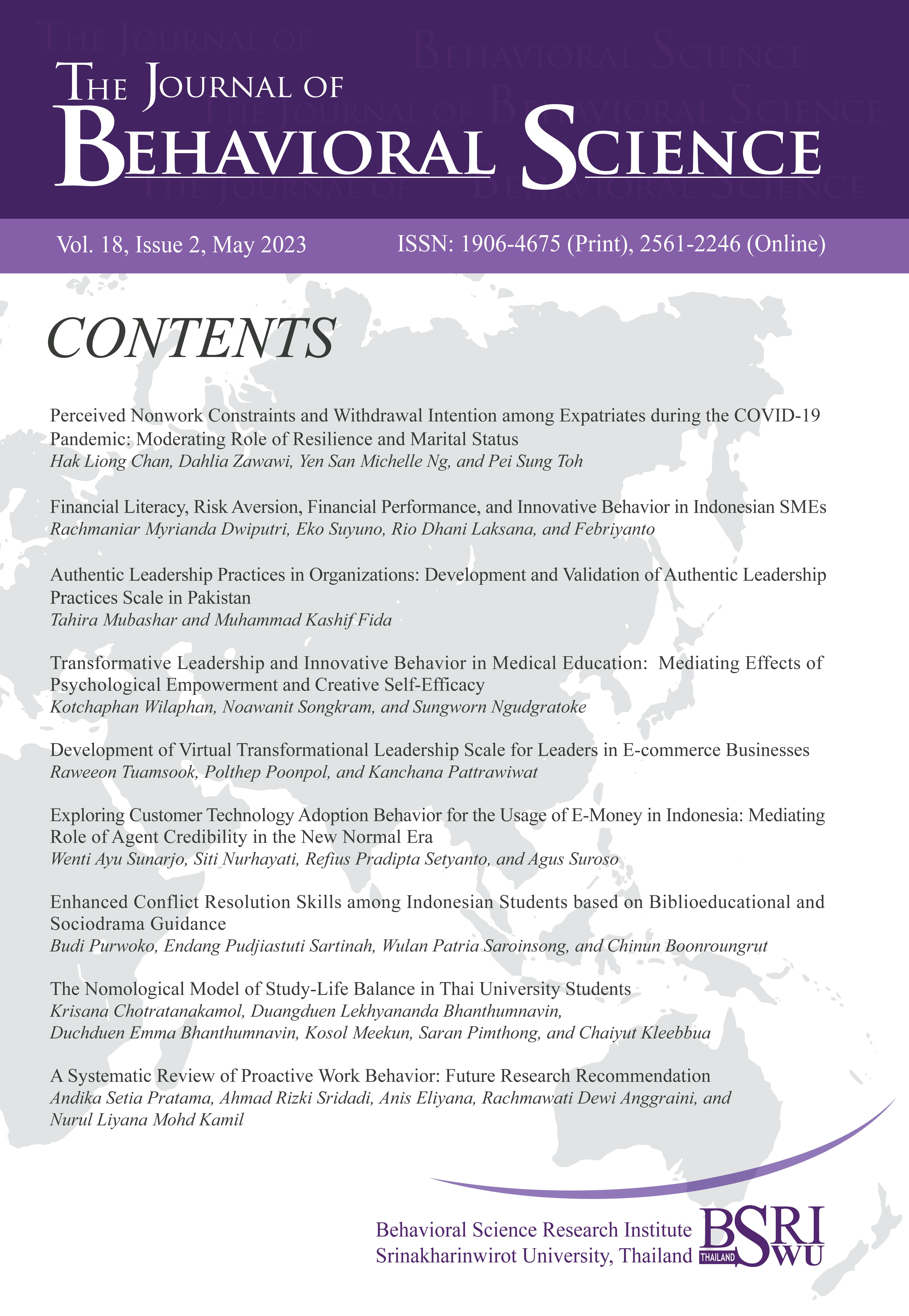The Development of E-health Literacy Indicators for Older Thai Adults in Adjusting to Live with the New Normal Lifestyle
Main Article Content
Abstract
The COVID-19 pandemic severely affected people of all ages, particularly affecting how they adapted themselves to the new normal lifestyle. However, these effects were especially observed in the older adults. Subsequently, the purpose of this study was to develop e-health literacy indicators for older Thai adults in adjusting to live with the new normal lifestyle. In addition, this study collected data to empirically test the hypothesized model with e-health literacy indicators model for older Thai adults. Respondents of the study were 410 older Thai adults, living or working in Bangkok and its vicinity. An exploratory factor analysis (EFA) and a confirmatory factor analysis (CFA) were performed to validate the factor structures obtained by EFA. These factor structures were validated through the first order of CFA; and the indicators and components found were: 1) media and information literacy component, with 19 indicators; 2) computer and social media literacy component, with 12 indicators; 3) COVID-19 literacy component, with 9 indicators; 4) healthcare literacy component, with 11 indicators; and 5) health risk literacy component, with 5 indicators. The second order of CFA proved that the e-health literacy indicators model had an acceptable fit with Chi-square/df = 2.41, RMSEA = 0.06, GFI = 0.95, NFI = 0.99, CN = 204.13. These findings potentially contribute towards facilitating the ease of living for older Thai adults, capable of using social media literately on a daily basis while maintaining personal self-care standards in accordance with the recognized new normal guidelines.
Downloads
Article Details

This work is licensed under a Creative Commons Attribution-NonCommercial-NoDerivatives 4.0 International License.
References
Bandura, A. (1990). Perceived self-efficacy in the exercise of control over AIDS infection.
Evaluation and Program Planning, 13(1), 9-17.
BBC Thai. (2021). The 50-50 co-payment: State remedy that makes the older adults face
difficulties. https://www.bbc.com/thai/thailand-55856076
Becker, M. H., & Maiman, L. A. (1975). The health belief model: Origins and correlation
in psychological theory. Health Education Monography, 2(4), 336-385.
Becker, M. H., Maiman, L. A., Kirscht, J. P., Haefner, D. P., & Drachman, R. H. (1977).
The health belief model and prediction of dietary compliance: A field experiment. Journal of Health and Social Behavior, 18(4), 348-366.
Brørs, G., Norman, C. D., & Norekvål, T. M. (2022). Accelerated importance of eHealth
literacy in the COVID-19 outbreak and beyond. European Journal of Cardiovascular Nursing, 19(6), 458-461.
Cronbach, L. J., & Shavelson, R. J. (2004). My current thoughts on coefficient alpha
and successor procedures. Educational and Psychological Measurement, 64(3), 391-418.
Department of Older Persons (DOP). (2022). The statistics of the older adults of 77 provinces in
Thailand as of December 31, 2021. https://www.dop.go.th/th/know/side/1/1/1099
Electronic Transactions Development Agency. (EDTA). (2020). Thailand internet user behavior.
Electronic Transactions Development Agency. (EDTA).
Foundation of the Thai Gerontology Research and Development Institute. (TGRI). (2021a). Only
9 percent of low-income older adults have access to digital technology to keep up with news. https://thaitgri.org/?p=39879
Foundation of the Thai Gerontology Research and Development Institute. (TGRI). (2021b).
Discussion forum:Fake News with the older adults who know how to keep up with media. https://thaitgri.org/?p=39755
Hair, J. F., Anderson, R. E., Tatham, R. L., & Black, W. C. (2019). Multivariate data analysis
(8th ed.). Prentice Hall.
Heo, J., Chun, S., Lee, S., Lee, K. H., & Kim, J. (2015). Internet use and well-being in
older adults. Cyberpsychology, Behavior, and Social Networking, 18(5), 268–272.
Kleechaya, P. (2020). Digital technology utilization of elderly and framework for promoting thai active and productive aging. National Research Council of Thailand (NRCT)
Kline, R. B. (2016). Principles and practice of structural equation modelling (4th ed.). The Guilford Press.
Levin-Zamir, D., & Bertschi, I. (2018). Media health literacy, eHealth literacy, and the role of
the social environment in context. International Journal of Environmental Research
and Public Health, 15(8), 1643.
National Statistical Office. (NSO). (2022). Survey on information and communication
technology usage in the household in 2021 (2nd Quarter). National Statistical Office.
NIDA Poll. (2021). 60+ overcome COVID-19 crisis to the next normal.
https://nidapoll.nida.ac.th/data/survey/uploads/FILE-1631169162889.pdf
Norman, C. D., Chirrey, S., & Skinner, H. A. (2002). Consumer perspectives on e-Health. In
H. A. Skinner (Ed.), Promoting health through organizational change (pp. 315-334). Benjamin Cummings.
Norman, C. D., & Skinner, H. A. (2006). eHealth literacy: Essential skills for consumer
health in a networked world. Journal of Medical Internet Research, (8),2, 1-10.
Paige, S. R., Krieger, J. L., & Stellefson, M. L. (2017). The influence of eHealth literacy
on perceived trust in online health communication channels and sources. Journal of health communication, 22(1), 53–65.
Pourrazavi, S., Kouzekanani, K., Bazargan-Hejazi, S., Shaghaghi, A., Hashemiparast,
M., Fathifar, Z., & Allahverdipour, H. (2020). Theory-based e-health literacy interventions in older adults: A systematic review. Archives of Public Health, 78(1), 1-8.
Preedy, V. R. & Watson, R. R. (2010). 5-Point Likert Scale: Handbook of burdens and
quality of life measure. Springer.
Rosenstock, I. M., Strecher, V. J., & Becker, M. H. (1988). Social learning theory and
the Health Belief Model. Health Education Quarterly, 15(2), 175–183.
Rovinelli, R. J., & Hambleton, R. K. (1977). On the use of content specialists in the
assessment of criterion-referenced test item validity. Tijdschrift Voor Onderwijs research, 2(2), 49–60.
The Standard. (2021). The first wave of outbreaks taught us that…? 5 lessons from Covid-
patients, the first 58 deaths in Thailand. https://thestandard.co/lessons-learn-from-thailands-first-58-covid-19-deaths/
Tyler, M., Simic, V., & De George-Walker, L. (2018). Older adult Internet super-users:
Counsel from experience. Activities, Adaptation & Aging, 42(4), 328-339.
Wae, A. (2020). COVID-19 and today’s learning to health behavior change. Journal of The Health Education Professional Association, 35(1), 24-29.
Watkins, I., & Xie, B. (2014). eHealth literacy interventions for older Adults: A systematic review of the literature. Journal of Medical Internet Research ,16(11), 1-12.
World Health Organization (WHO). (2020). Q&As on COVID-19 for older people.


